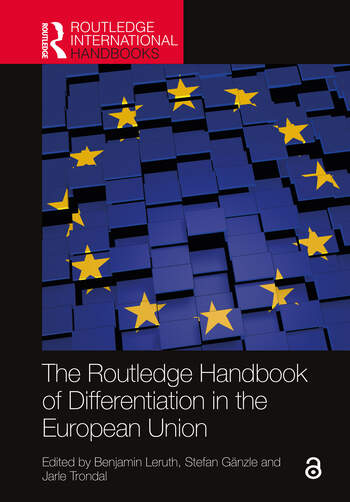Glencross, A. & Brusenbauch Meislová, M. (2022). Differentiation and Power Asymmetry: How Brexit is Changing UK Relations with Czechia and Slovakia. In Leruth, B., Gänzle, S., & Trondal, J. (Eds). The Routledge Handbook of Differentiation in the European Union, (pp. XX-YY). Routledge.
Book description
The Routledge Handbook of Differentiation in the European Union offers an essential collection of groundbreaking chapters reflecting on the causes and consequences of this complex phenomenon.
With contributions from key experts in this subfield of European Studies, it will become a key volume used for those interested in learning the nuts and bolts of differentiation as a mechanism of (dis)integration in the European Union, especially in the light of Brexit. Organised around five key themes, it offers an authoritative “encyclopaedia” of differentiation and addresses questions such as:
-
- How can one define differentiation in the European Union in the light of the most recent events?
-
- Does differentiation create more challenges or opportunities for the European Union?
-
- Is Europe moving away from an “ever closer Union” and heading towards an “ever more differentiated Union”, especially as leading political figures across Europe favour the use of differentiation to reconcile divergences between member states?
This handbook is essential reading and an authoritative reference for scholars, students, researchers and practitioners involved in, and actively concerned about, research in the study of European integration. As European differentiation is multifaceted and involves a wide range of actors and policies, it will be of further interest to those working on countries and/or in policy areas where differentiation is an increasingly relevant feature.
Chapter abstract
The chapter explores the potential change in power relations wrought by Brexit-related differentiation as the United Kingdom (UK) sought to withdraw from the European Union during the Article 50 negotiations. In particular, it examines and compares two of the UK’s bilateral relationships long defined by acute power asymmetry: Czechia and the Slovak Republic. The analysis demonstrates the renewed importance of bilateralism for the UK’s engagement with European partners as a consequence of Brexit and shows that the UK sought to make its traditional power asymmetry work to secure its interests in the first phase of Brexit negotiations.
Cite this book chapter
Glencross, A. & Brusenbauch Meislová, M. (2022). Differentiation and Power Asymmetry: How Brexit is Changing UK Relations with Czechia and Slovakia. In Leruth, B., Gänzle, S., & Trondal, J. (Eds). The Routledge Handbook of Differentiation in the European Union, (pp. XX-YY). Routledge.

